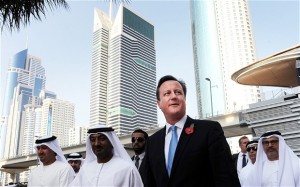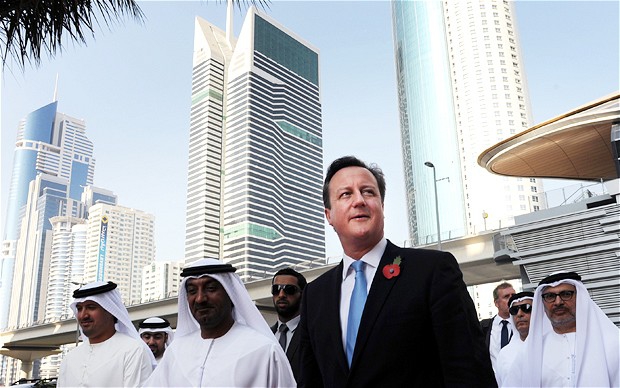
Britain could build up its military presence in the Gulf to counter the growing threat from Iran after the drawdown of troops in Afghanistan, it has emerged.
The news came as Prime Minister David Cameron, on a three day visit to the Gulf region to push sales of Typhoon jets, said the UK would do �everything to stop� Iran successfully developing nuclear weapons.
Government sources said the plans which could see Britain�s presence in the UAE boosted were part of a strategy set out in the strategic defence review to have a �flexible network of allies to deal with different threats�.
The source said that �of course� Britain was looking at contingency planning if the situation in Iran worsened, adding �that is why it is sensible to look at what allies we have in the Gulf region�.
Britain is evaluating whether to beef up a force of around 70 servicemen and women currently stationed in the United Arab Emirates to service jets flying between the UK and Afghanistan.
The Royal Air Force is currently running a twice-yearly advanced training leadership course from the base in the UAE, involving four Typhoon or Tornado jets and an additional 100 servicemen and women.
The source said: �As our plans for operational drawdown we have to look at the routes we use. No decisions have been taken but it makes sense to have a strategic ally.�
Britain was looking to do some �significant co-operation� with the Emiratis, the source added, because it was looking at developing links with a non-Nato ally.
No decisions had been made about whether British soldiers, who are being pulled out of Afghanistan by 2014, would be deployed if the situation in Iran worsened though.
Mr Cameron on Monday issued one of his most strongly worded warnings about Iran�s nuclear weapons programme. He told a group of around 200 students at a university in Abu Dhabi that Iran developing nuclear weapons would not only be a "desperately bad development for our world" but could "trigger a nuclear arms race across the whole of the region�.
Tehran was trying to develop nuclear weapons which he said would make the Middle East "a more unstable and more dangerous place", he said: "We should do everything we can to stop it happening."
During a 30 minute question and answer session, he said: "Iran does pose a threat in two ways. First of all, if Iran is embarked on trying to acquire a nuclear weapon, as I believe it is, that is a threat in itself, particularly given what Iran has said about other countries in the region, and in particular about Israel, about wanting to 'wipe it off the map'.
"In itself it is a hugely concerning development, a desperately bad development for our world and that is why we should do everything we can to top it happening.
"But I think there is a second reasons why it is so why it is so concerning and that is because I think it could trigger a nuclear arms race across the whole region.
�That would consume a huge amount of resources and energy but also I think make the Middle East a more dangerous, more unstable part of the world.
"So I think that for all those reasons it is right for like-minded countries to do everything they can to try to persuade the Iranians to take a different course," paying tribute to the fact that Dubai had almost entirely ended trade with what was one of its biggest trading partners.
It was "perfectly acceptable" for Iran to want civilian nuclear energy, he said. "The message we need to send to Iran is: there is a peaceful path; there is a path you could take that will remove the pariah status from your nation and that is to accept that you could have civil nuclear power but not military nuclear power and then we could have a proper discussion."
Mr Cameron was also critical of the United Nations for failing to get member states to agree some form of joint action over Syria, where tens of thousands of civilians have died in the civil war.
He said: �In the case of Syria the UN has let the world down. That is really because two of the permanent members, Russia and china, have not been prepared to see a strong resolution that condemns what President Assad has done to his own people.
�I worry that when the history books are written, people will look back and say: why couldn�t we do more when we knew twenty, thirty, forty thousand people lost their lives?�
The Iran Project is not responsible for the content of quoted articles.











